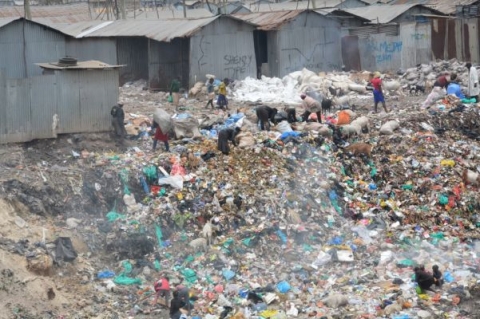

The award will fund a two year project which aims to reduce plastic waste in low and middle income countries
30 June 2020
3 min read
Researchers from the University of Portsmouth have been awarded £180,000 to help reduce plastic pollution in developing countries.
An interdisciplinary team, led by Professor Steve Fletcher and Dr Cressida Bowyer have received funding from the UK Government’s Global Challenges Research Fund for a two-year project ‘Catalysing sustainability transitions in cities in the global south suffering from severe plastic pollution’.
The project, which contributes to a number of United Nations (UN) Sustainable Development Goals, will use Nairobi (Kenya) and Sylhet (Bangladesh) as the case study cities.
Using arts-based projects, the researchers will work with local communities, business and authorities to map current systems of waste management and identify opportunities for reducing plastic waste leaking into the environment.
The research findings and methods will be shared in a knowledge exchange workshop (scheduled for April 2021) that includes representatives from up to 10 other Development Assistance Committee countries. These are low and middle-income countries that receive official development assistance from the UN.
Other outcomes will include policy briefings, with practical examples of effective circular economy and education techniques, and arts-based communications to promote the results to mixed literacy urban populations.
Professor Fletcher, Director of the Sustainability and the Environment research theme and lead on the University’s Revolution Plastics initiative, said: “We've started a revolution to tackle the global plastic crisis. We’re collaborating with scientists, businesses, campaigners and communities to create a global model to build a world that’s more sustainable. This fantastic project will develop new governance approaches and empower local communities to create opportunities and solutions through art.”
In response to the global coronavirus pandemic, the project will also document the impact of COVID-19 on the production and disposal of plastic, any increased need and use of plastics during this crisis, and how the flow and leakage in Nairobi and Sylhet is changing.
Dr Bowyer said: “Major crises test existing systems and disruptions can serve as a trigger for transition and transformation. As and when the global recovery begins, there will be unprecedented opportunities for transformation and transition to a more sustainable future - to build back better. This project hopes to identify and catalyse novel solutions to plastic waste management in the post-COVID world.”
Dr Bowyer joined the Portsmouth Trade Mission to Bangladesh last November to begin the initial phase of connecting with key partners, such as the AMAL Foundation and Eco-Social Development Organisation (ESDO). The group visited Sylhet for the official signing of a twin city agreement in which the project was formally recognised. External collaborators include UN Habitat, Wajukuu Arts and Mukuru Youth Initiative
